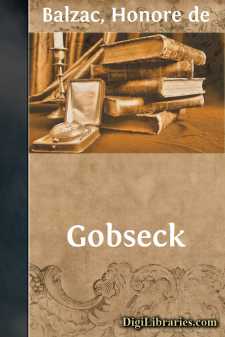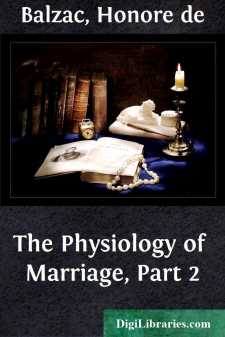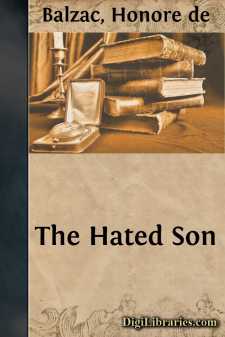Categories
- Antiques & Collectibles 13
- Architecture 36
- Art 48
- Bibles 22
- Biography & Autobiography 813
- Body, Mind & Spirit 142
- Business & Economics 28
- Children's Books 15
- Children's Fiction 12
- Computers 4
- Cooking 94
- Crafts & Hobbies 4
- Drama 346
- Education 46
- Family & Relationships 57
- Fiction 11829
- Games 19
- Gardening 17
- Health & Fitness 34
- History 1377
- House & Home 1
- Humor 147
- Juvenile Fiction 1873
- Juvenile Nonfiction 202
- Language Arts & Disciplines 88
- Law 16
- Literary Collections 686
- Literary Criticism 179
- Mathematics 13
- Medical 41
- Music 40
- Nature 179
- Non-Classifiable 1768
- Performing Arts 7
- Periodicals 1453
- Philosophy 64
- Photography 2
- Poetry 896
- Political Science 203
- Psychology 42
- Reference 154
- Religion 513
- Science 126
- Self-Help 84
- Social Science 81
- Sports & Recreation 34
- Study Aids 3
- Technology & Engineering 59
- Transportation 23
- Travel 463
- True Crime 29
Gobseck
by: Honore de Balzac
Categories:
Description:
Excerpt
GOBSECK
It was one o'clock in the morning, during the winter of 1829-30, but in the Vicomtesse de Grandlieu's salon two persons stayed on who did not belong to her family circle. A young and good-looking man heard the clock strike, and took his leave. When the courtyard echoed with the sound of a departing carriage, the Vicomtesse looked up, saw that no one was present save her brother and a friend of the family finishing their game of piquet, and went across to her daughter. The girl, standing by the chimney-piece, apparently examining a transparent fire-screen, was listening to the sounds from the courtyard in a way that justified certain maternal fears.
"Camille," said the Vicomtesse, "if you continue to behave to young Comte de Restaud as you have done this evening, you will oblige me to see no more of him here. Listen, child, and if you have any confidence in my love, let me guide you in life. At seventeen one cannot judge of past or future, nor of certain social considerations. I have only one thing to say to you. M. de Restaud has a mother, a mother who would waste millions of francs; a woman of no birth, a Mlle. Goriot; people talked a good deal about her at one time. She behaved so badly to her own father, that she certainly does not deserve to have so good a son. The young Count adores her, and maintains her in her position with dutifulness worthy of all praise, and he is extremely good to his brother and sister.—But however admirable his behavior may be," the Vicomtesse added with a shrewd expression, "so long as his mother lives, any family would take alarm at the idea of intrusting a daughter's fortune and future to young Restaud."
"I overheard a word now and again in your talk with Mlle. de Grandlieu," cried the friend of the family, "and it made me anxious to put in a word of my own.—I have won, M. le Comte," he added, turning to his opponent. "I shall throw you over and go to your niece's assistance."
"See what it is to have an attorney's ears!" exclaimed the Vicomtesse. "My dear Derville, how could you know what I was saying to Camille in a whisper?"
"I knew it from your looks," answered Derville, seating himself in a low chair by the fire.
Camille's uncle went to her side, and Mme. de Grandlieu took up her position on a hearth stool between her daughter and Derville.
"The time has come for telling a story, which should modify your judgment as to Ernest de Restaud's prospects."
"A story?" cried Camille. "Do begin at once, monsieur."
The glance that Derville gave the Vicomtesse told her that this tale was meant for her. The Vicomtesse de Grandlieu, be it said, was one of the greatest ladies in the Faubourg Saint-Germain, by reason of her fortune and her ancient name; and though it may seem improbable that a Paris attorney should speak so familiarly to her, or be so much at home in her house, the fact is nevertheless easily explained.
When Mme. de Grandlieu returned to France with the Royal family, she came to Paris, and at first lived entirely on the pension allowed her out of the Civil List by Louis XVIII.—an intolerable position....












